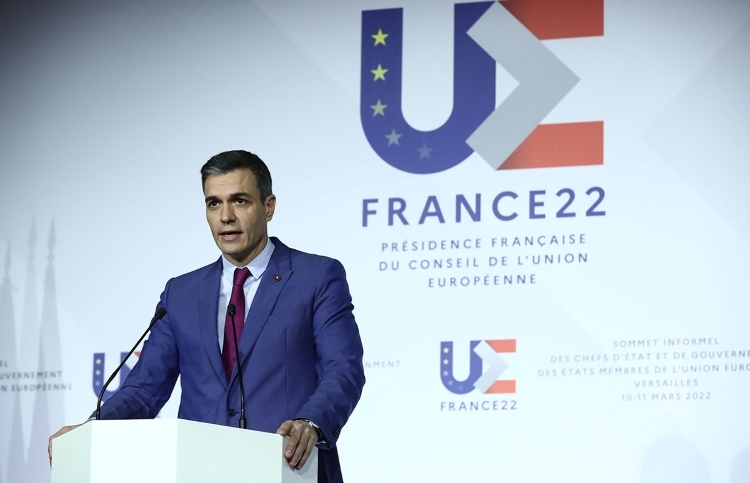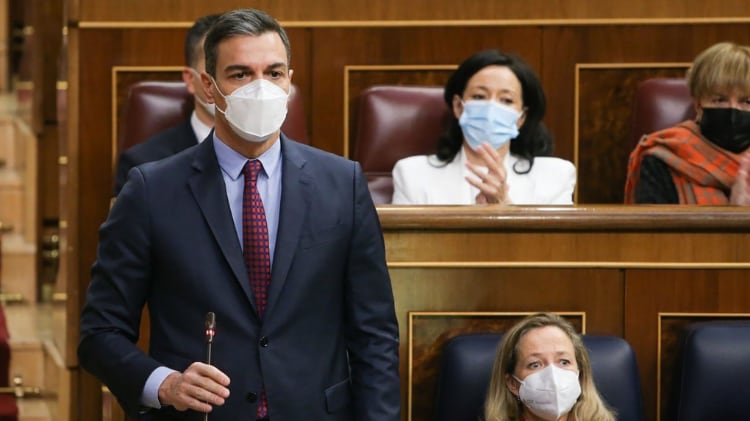Eduardo González
The President of the Government, Pedro Sánchez, today begins a busy round of contacts with eight countries of the European Union with the aim of gaining allies to the Spanish proposal to decouple gas and electricity prices, a debate that began to be addressed last autumn and which has taken on a new dimension with the invasion of Ukraine and the EU’s attempts to minimize energy dependence on Russia.
The round, which was announced by Sánchez last March 12 at the end of the informal European Council in Versailles, will begin today in Madrid with the Prime Minister of Croatia, Andrej Plenković, whom he will receive this morning at the Moncloa Palace, and will continue from this afternoon with a tour of Slovakia (with Prime Minister, Eduard Heger), Romania (March 17, with Prime Minister, Nicolae Ciucă; and President, Klaus Iohannis), Italy (March 18, with Prime Minister, Mario Draghi; Prime Minister of Portugal, António Costa; and Greek Prime Minister Kyriakos Mitsotakis), Germany (March 18, working dinner with Chancellor Olaf Scholz) and Ireland (March 22, working dinner with Prime Minister Micheál Martin).
During the informal summit in Versailles, convened by the French Presidency of the EU, the 27 reached an agreement to ask the European Commission to prepare, before the end of March, a document with “concrete, urgent and immediately effective measures to substantially reduce electricity prices”. At the end of the meeting, Pedro Sánchez stressed that, for the first time, the underlying problem of this crisis had been addressed: the “contagion effect” of natural gas prices in the electricity market due to the current price formation rules. According to the head of the Executive, measures to decouple gas and electricity prices “are not only urgent, but necessary” and there is already a broad consensus among Member States on the need to intervene in the energy market.
According to what the Government spokesperson, Isabel Rodríguez, declared yesterday in the press conference after the Council of Ministers, Sánchez’s tour will allow defending Spain’s position and is supported by the recent agreement of La Palma between the Executive and the autonomous presidents (“feeling accompanied by all the autonomous presidents makes Spain stronger”, she stated).
She also recalled that the head of the Executive has demanded in recent months that the prices of electricity and gas be decoupled, that the EU make centralized purchases in the wholesale markets (similar to that carried out with the vaccines against COVID-19), that renewable energies be accelerated “as much as possible” and that gas interconnections in Spain be encouraged in order to provide security and autonomy to the European Union. These will be the proposals, she specified, that Spain will present at the meeting of the European Council to be held in Brussels on March 24 and 25.
According to sources of the Executive gathered by the agency Europa Press, the objective of this round of contacts is to look for allies to join Spain’s proposal. In this sense, these sources consider Italy, Greece and Portugal to be more inclined and Germany, which is more dependent on Russian gas, much less so. However, the feeling is that the conclusions of Versailles are going in that direction and, therefore, Sánchez’s proposals are gaining strength. “In the European Council of March 24 and 25, we have a lot at stake,” declared the President of the Government on Monday during an interview with La Sexta: “We have to decouple the price of gas from the price of electricity. Now, most of the EU governments know that this connection is very harmful for the economy and citizens. We have to reach an agreement,” he added.
Spain has an energy mix in which 45% of electricity production comes from renewable energies, which are highly competitive, cheap, clean and guarantee energy autonomy. Apart from that, with a diversified supply, with Algeria and the USA as main suppliers, Spain does not depend on Russian gas, from where it only imported 8.7% in 2021. Therefore, our country will not be affected by the lack of supply as it has six of the 24 regasification plants in Europe, although Spain is affected by the rise in energy prices due to the impact of the conflict in Ukraine on international markets.







